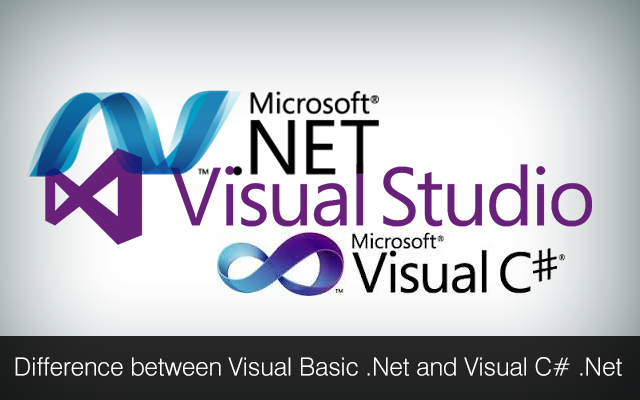Difference between Visual Basic .Net and Visual C# .Net
 There are 2 primary languages that are used in the .NET framework – Visual Basic .NET and C# .NET. Syntactically these are completely different from each other and have different history as well. The C# is based on the C programming language that was developed by Dennis Ritchie. It has since then evolved to C++ and then later to C#. However, though they are syntactically different, both were developed by Microsoft to be a part of .NET framework development platform. Both these languages are developed, managed and supported by a single management team at Microsoft. The IL or intermediate language in which they are compiled is the same. If one avoids the VB Compatibility libraries, then every command in Visual Basic has an equivalent one in C#. Another similarity between these two is that for extending their functionality both the languages refer to the same Base Classes available with ASP.NET framework. Barring a few exceptions, any program written in either of the languages can be injected on a simple syntax converter for translation.
There are 2 primary languages that are used in the .NET framework – Visual Basic .NET and C# .NET. Syntactically these are completely different from each other and have different history as well. The C# is based on the C programming language that was developed by Dennis Ritchie. It has since then evolved to C++ and then later to C#. However, though they are syntactically different, both were developed by Microsoft to be a part of .NET framework development platform. Both these languages are developed, managed and supported by a single management team at Microsoft. The IL or intermediate language in which they are compiled is the same. If one avoids the VB Compatibility libraries, then every command in Visual Basic has an equivalent one in C#. Another similarity between these two is that for extending their functionality both the languages refer to the same Base Classes available with ASP.NET framework. Barring a few exceptions, any program written in either of the languages can be injected on a simple syntax converter for translation.
So how do these differ from each other inspite of such similarities? Well, here are a few points on which these languages completely vary from one another:
Case Sensitivity: In VB framework, the identifier names are not case sensitive but those in C sharp are. While writing a code the developers may face a problem due to this but when debugging an existing program there are no issues.
Development Environment: Visual Studio plays an important role here in producing differences between the two, though minor in nature. There are certain additional features present in Visual Basic .NET, like, default namespace, option for hidden files, etc. In addition to this the background compilation feature is available for VB. Due to this the Error List panel is synchronized. But in C Sharp the error list panel can only be updated when the solution is rebuilt. This becomes increasingly difficult as there is the need for frequently rebuilding the solution.
Variables – Declaration and Assignment: Variables are declared in Visual Basic.NET prior to the data type. On the other hand, in C# it precedes the data type.
Dealing with Unmanaged Code: Unmanaged codes can be written freely on C#. While writing these codes the developers can operate and declare on pointers or opt for conversions between the kinds of integral and pointers. This is quite similar to writing Visual C code. In the other language writing unmanaged code is not allowed.
Termination of Statement: By the end of the line statements are terminated in VB.NET. Colon (:) is used to accommodate multiple statements in a single line. Apart from this, the line continuation (_) is used if the programmers want to span the statement several lines. For C#.NET semicolon (;) terminates the statement.
Passing Parameter: ByVal is used by Visual Basic dot NET for passing parameters by value and the ByRef for passing parameters by reference. This language can also force the parameters to pass by value irrespective of the fact how they were declared. Optional parameters are also included here which are clearly missing in C#. There are no options to pass reference types by value. In this case the unmanaged codes prove helpful as they can convert from pointer to pointer.
Statement Blocks: These are not used in Visual Basic dot NET. Rather particular keywords with special terminating statement are put to use. The other language uses braces ({}) to restrict a statement block. In case, these are not used, it is considered to be a single statement.
Checking Overflow: For checking overflow there is a project level setting in VB. This setting can be turned on or off at the project level only. On the contrary, the C sharp can run on both checked and unchecked context.
Late Binding: This can be applied to both the languages through reflection. But this process is easier in VB than C#.
The choice of language in building solutions is completely a personal preference. Since both of them use the same core platform, they are quite powerful. To get maximum benefits of .Net, you may consider hiring services of a custom .net development company.
We provide asp.net development services. If you would like to talk to one of our expert dot net developers, please get in touch with us at Mindfire Solutions.